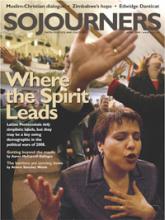Haitian novelist and memoirist Edwidge Danticat was born near Port-au-Prince in 1969 under the dictatorship of “Papa Doc” Duvalier. When she was 2, her father left Haiti on a tourist visa and found work as a taxi driver in New York. In 1971, Danticat’s mother also left for New York, leaving Edwidge in Haiti in the care of her aunt and uncle, Denise and Rev. Joseph Dantica. When she was 12, Edwidge joined her parents in New York, where she learned English. She published her first novel, Breath, Eyes, Memory, at age 25, for which she won a Pushcart Prize.
In October 2004, Joseph, her 81-year-old uncle, who pastored a small church near Port-au-Prince, was caught in the crossfire between U.N. peacekeeper tanks, the Haitian police, and armed gangs. His life was threatened. He decided to leave Haiti for the United States until things calmed down. Upon arriving in Miami—with correct, complete, and valid documents—he was put in hand and ankle manacles by officers of the Department of Homeland Security and Immigration and Customs Enforcement and sent to Krome Detention Center. Within two days, he was dead.
Edwidge Danticat’s book Brother, I’m Dying—nominated in January for a National Book Critics Circle Award—recounts the events that led to her uncle’s death in custody and shines a light on the sometimes-lethal consequences of U.S. immigration policy. Sojourners associate editor Rose Marie Berger interviewed Danticat by e-mail in January 2008.
—The Editors
Rose Marie Berger: Many people feel that the U.S. immigration system is antiquated, inefficient, and—as in the case of your uncle, Rev. Joseph Dantica, and many others—also deadly. What was your perception of the U.S. immigration system before the death of your uncle while under Customs and Border Patrol custody and what are your insights now?
Read the Full Article
